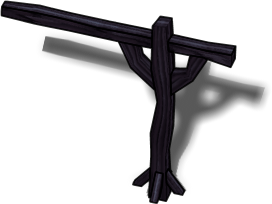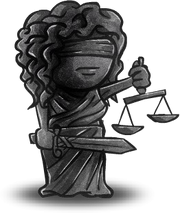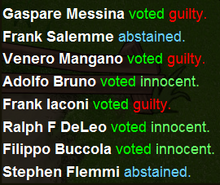
The gallows at day

The gallows at night

Executioner's icon, shown as lynching

Lady Justice statue visible during the judgement phase


Guilty button highlighted

Innocent button highlighted
Lynching is an action that can be performed by anyone during the voting phase of the game. It involves a player being voted onto the gallows and then being voted as to whether they are ![]() or
or ![]() . Lynching is a crucial element towards the end of the game, especially if Town Killing roles are dead.
. Lynching is a crucial element towards the end of the game, especially if Town Killing roles are dead.
The process of Lynching
- Voting: Every living player can openly vote for one other living player that was not protected by a Guardian Angel the night before. Votes may be retracted or changed freely, but player's votes may be blocked if they change and/or retract their votes too fast (causing the system to mute the player's vote for spam). A revealed Mayor's vote is worth three votes. If a player receives enough votes (more than half of the Town), they are put on trial. Otherwise, the Day phase ends.
- Defense: The player being accused is given a brief section of time where they can testify their innocence. If the player is blackmailed, anything they write will appear as, "I am blackmailed." to other players once. Everything else will not be registered. The remaining players may not talk, only whisper. Dead players may still talk in dead chat.
- Judgement: The remaining players are allowed to secretly (your name will appear when you vote, but it will not say what you’ve voted) vote on whether they think the player being hanged is guilty or not. All players may talk, the accused can keep on defending themselves (if not blackmailed), and the remaining players can attempt to convince the others. At the end, all votes and the names of the voters are revealed. If the accused player is found to be innocent, they will simply walk off the gallows, but if they are found to be guilty, they will prepare to be lynched (as per their Death Animation).
- There are 3 message that appear when you are deciding your vote. When you vote it will say [player name] has voted. When you change your vote from one to another (Ex: guilty to innocent) will say [player name] changed their vote. When you cancel your vote, it will say [player name] has cancelled their vote.
If the majority of voters voted guilty, the accused is given a few more seconds to express any last words before being lynched. Other players may not talk during this time, only whisper. Afterwards, the game goes through the usual process of revealing said person's Last Will and role. The day ends.
If the majority of voters voted innocent, or a tie occurs, the day will not end. The voting phase will continue with the time remaining from before. You can have up to 3 trials before the day ends automatically. These trials can have any 3 people voted up, even if it's the same person.
Things for Townies to consider before and during Lynching
Lynching can be a great decision or a disastrous one for any faction. Any player needs to give careful thought about who to lynch based on the evidence available.
- Asking for attributes/abilities is considered metagaming. Although it's not wrong to metagame, it's highly frowned upon by the community. Players can also view the rolecards in-game, nullifying this. This is extremely rare now.
- Is there substantial evidence against the accused player? If so, what is the evidence, and how valid is it? If the evidence is good and the players giving evidence are trusted, go for the lynch. If the accuser claims to be a Sheriff, Investigator, etc. and accuses someone on Day 2, they may be an Executioner.
- Has the player who is being accused been trying to cause trouble, or trying to accuse others based on little evidence? If so, be careful, as this might be a Jester or Executioner, though, said player could possibly be a member of the Mafia, or other evil.
- Is the player presenting poor evidence in order to declare innocence? They are either a bad player in general, a Jester who is purposely trying to increase suspicion against themselves, or a member of the Mafia or Serial Killer who is trying in vain to defend themselves.
- Do they seem to give up or don't care if they die? They may be a Jester as they are simply biding time until they are lynched, or an evil player pretending to be a Jester.
- How many members of the Mafia are left? If there are still at least three members of the Mafia alive, be careful as they could be pulling the strings of voting and deciding on the target being guilty or innocent.
- How fast are people voting? Typically, if a decent number of people vote immediately, they voted guilty. If this is happening often where 3 people consistently vote people up without substantial evidence, they may be cheaters, gamethrowers or members of the Mafia. This can be a way to decide if you should abandon a fellow member of the Mafia or try to push them off the hook.
- Another thing to note is that if it is early game, and it is a random lynch, do not always think that this person is evil. It is most likely a random sample of the 15 players in the game, so it is not always going to be a straightaway evil, unless they give no role and will and simple question the trials. Then they most likely will be lynched by the Town.
These are some of the questions that you may have to consider when someone is being voted to be lynched. Always be critical at the start of the game in your assessment, as chances are a lynch in the first or second round won't include a lot of evidence. Sometimes, unconsidered voting turns into random lynching and players can be killed in the first or second trials. If you are very unsure about the decision to hang them, then abstain (don't vote) or just click innocent. Assessing who needs lynching and who doesn't is a hard thing to do, and you may have it wrong sometimes, but knowing who to lynch is a skill that needs to be developed over time.
Evading lynches
Drawing yourself out of the gallows is easier said than done, and requires a good deal of deception or intuition.
- Use evidence: Whether you are a Townie or member of the Mafia, evidence for and against you is a key part in deciding your innocence. If you are a Townie and there is evidence to suggest you are innocent, you need to bring it up before or during the process. If you are a member of the Mafia, Serial Killer or Executioner, you either need to falsify your evidence or suggest that there isn't much evidence. Essentially, seem logical about your reasons and people may listen to it, though some won't care and will call you guilty anyway.
- Pretend to be another role: This is a valid technique for not being lynched, although take care to note which roles are left and which aren't. If you are able to hint that you are a Jester in some way, players may then try to vote for your innocence as the Jester can kill a guilty voter or abstainer the night after they were lynched. If you are able to use a role that hasn't died yet, or pretend that your role is a Town Killing or Random Town role, then you may very well run away with it. If you are playing an All Any game, then you should be able to run away with it. If you're a Townie, there is no reason to falsify your role unless in a situation where your actual role would be a suspicious claim (Eg: Claiming Bodyguard after an Arsonist ignites)
- Claiming to be a Jester usually only works if you have acted like a Jester before. If you suddenly go from serious to Jester-like, the Town will likely not believe you and hang you. Even if you are playing a fake Jester game smoothly, faking to be a Jester is such a common claim that you may be lynched no matter what. Never say out loud that you are a Jester because the town will never believe you, as it goes against what the Jester wants, which is to be lynched. Even if the Town didn't lynch you, the Jailor will likely execute you, or a Vigilante will shoot you.
- Sometimes you may be randomly lynched, meaning you were put on trial for no reason, and usually starts out with one person voting against you, then the rest of the votes following. This happens to everyone at one point or another, and should not be taken seriously. When you are randomly lynched, it is very difficult to bring yourself off the hook. Tell them the first voter is an Executioner and start to say your role, and you may be able to escape the random lynch. You can also bring up the fact there is no evidence against you, and at least some players will see reason.
On occasion, it is not recommended that you attempt to bring yourself away from the hook, namely with Jester, although sometimes this applies to members of the Mafia. A wave of suspicion can come over the other Townies if someone votes innocent for someone despite them being a Mafia, as usually these people are seen as other members of the Mafia for trying to draw their buddy off the hook. If you are a member of the Mafia and it looks like a fellow member of the Mafia is going to be hanged, vote for them as well and move the suspicion away from you. It's a valid technique and said member of the Mafia will still win if you go on to win the game for them. If you hang a fellow member of the Mafia and they call you out, report them and try to convince the Town that you are actually a Townie and that they are trying to frame you.
Neutrals, Mafia, and Lynching
Lynching is an essential part of the main two Neutral roles, Jester and Executioner roles, and towards the end of the game, it can be an important part of how the members of the Mafia win. A Jester's entire existence revolves around trying to be lynched, and it is an achievement for any Jester to have themselves lynched, as it involves a great deal of deception. Similarly, the Executioner has to try and have their target (which is always a Townie or a Townie converted to become a Vampire, but never the Jailor or Mayor) lynched, sometimes on very little evidence, which can be tricky. Here are some points for the Neutral and Mafia roles to consider when using lynching:
- If you are a Jester, feel free to play along with any lynching you want. It may end up putting suspicion on you, but don't make yourself too obvious in terms of accusation or in how you try to control any Town arguments, as you may be classed out as a Jester or Executioner. Another strategy is to try to look like a bad Executioner, have yourself lynched by yelling out your target. This can also help the Mafia, Serial Killer, and even the Arsonist as the Town will think the accused person is a Townie.
- If you are an Executioner, also feel free to play along with lynching, but if there is suspicion against your target, then press on it, but never accuse your target too early on, unless you want to be accused of being an Executioner from an early point in the game.
- If you are any Neutral role and your target or aim is not seeming likely for you to achieve, then play till the end of the game, and if you want, you could try picking a side and attempt to help/bribe them. Sometimes Neutral roles are hard to pull off, but you can at least survive until the end.
- As a Survivor, try not to side until late game. If you are put on trial or jailed, you'll have to claim to side with the Town, but if not picking a side is most likely a bad idea. By the end, you will be able to tell who's winning and pick the winner. Siding too early will end up with the other factions killing you.
- If you are part of the Mafia, going along with early lynching or accusations might arouse suspicion put on you later on. Keep back on lynching unless the whole Town is doing it. As said earlier, lynching your comrades after they are accused might draw you out of suspicion in a tight spot.
- After a certain point in the game, depending on how many members of the Mafia are left, the Mafia can start to "out-vote" people in the voting phase. Calmly lynching people at day while killing them off at night in the late phase of the game can lead to a steady and easy victory. Lynching a Veteran is always a safer option than going for them at night.
- If you know that there is a Pestilence in the game, you need to be wary that the only way to kill it now is by lynching. It has invincible defense, so that means that the Town has to lynch the Pestilence before it's too late.
Trivia
- The statue seen when somebody is voted up is the famous statue of Lady Justice, holding a scale in one hand and sword in the other, while wearing a blindfold. The blindfold depicts that Justice sees all equally, the scale weighs the evidence and statements and the sword depicts that Justice can be Swift and final.
- In the mobile app, the statue raises its sword if you vote guilty and raises its scale if you vote innocent. However, if you abstain, it will raise neither.
Bugs and Technical Problems in the Lynching system
- If a player leaves after they voted, their vote still counts. However, it doesn't say what that player voted, or that they voted.
- A player's vote can register as something that is different than what they voted if they vote at the very end of the voting phase when the game cannot process a vote change.
- If a player leaves during voting phase, they cannot be voted up, but the button for voting a player up will still be visible.
- If a player leaves during the voting phase, the amount of players needed to vote someone up decreases by one but does not update.
- The Veteran is always the first voter, The Werewolf is always the last voter if there is one in the game, basically the votes are listen in priority. (Bug)
- If the Mayor votes a player as soon as the Voting phase starts, the message "Votes are needed to send someone to trial" is still present.
Quotes
- "[Number] votes are needed to send someone to trial." - Start of voting phase
- "The Town has decided to put [Player] on trial" - When a player is voted to go on trial
- "[Player], you are on trial for conspiracy against the town. What is your defense?" - Defense portion
- "The Town may now vote on the fate of [Player]." - The Town's verdict portion
- If found innocent,
- "The Town has decided to pardon [Player] by a vote of [Guilty votes] to [Innocent votes]."
- If found guilty,
- "The Town has decided to lynch [Player] by a vote of [Guilty votes] to [Innocent votes]."
- "Do you have any last words?" - The voted Player's final words before being lynched
- "May God have mercy on your soul, [Player]." - The voted player being lynched.


